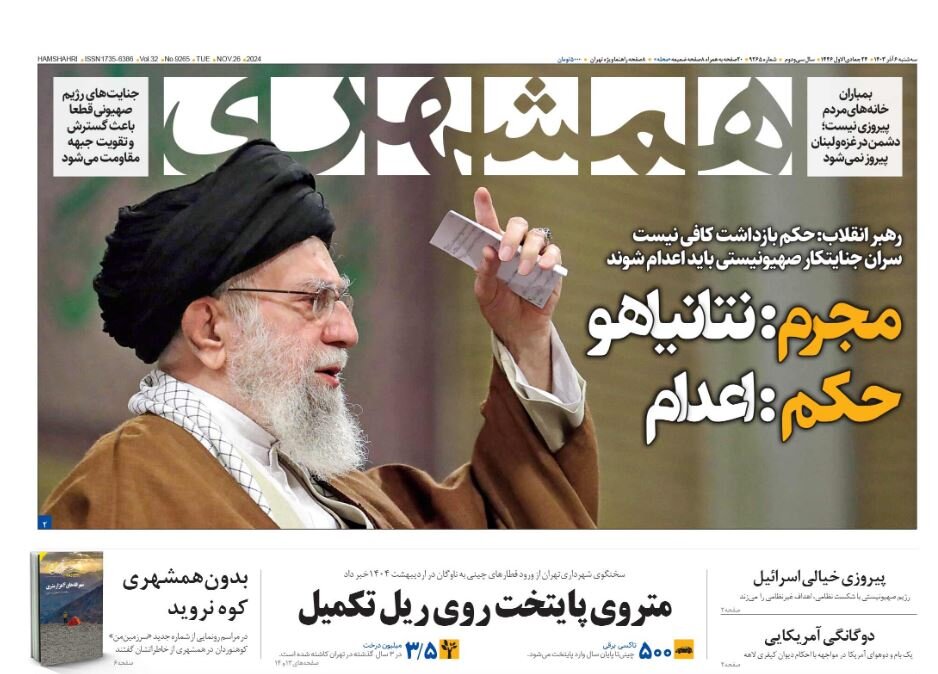The Wests return to talks with Iran
The West's return to talks with Iran
TEHRAN - In a note, Hamshahri addressed the upcoming negotiations between Iran the European trio of Britain, Germany and France.

It wrote: The new negotiations of the Islamic Republic of Iran with three European countries are an opportunity to review the international interactions between Iran and the West. The West has repeatedly made strategic mistakes in dealing with the Islamic Republic of Iran. Imagining that Iran would be in a weak position at home and abroad, these countries abandoned negotiations and intensified political and economic pressures on the Islamic Republic. The West's return to the negotiation table with Iran is a reflection of their increasing concerns about the impact of the Axis of Resistance and Iran's technical advances. Although the path of negotiations will be challenging, Iran has shown that it can maintain the atmosphere of diplomacy in its favor by relying on rational policies and authority. In the meantime, strengthening the Axis of Resistance and emphasizing the rights of the oppressed nations will remain the priority of the foreign policy of the Islamic Republic.
Iran: Why Europe and why now?
In an analysis, the Iran newspaper said there has been no change in Iran's foreign policy. It wrote: Some consider negotiations with Europe (the European trio of Britain, France and Germany) a new thing or at least a continuation of the policies of the Rouhani administration. But the negotiations which will start on Friday are not new. There are misunderstandings between Iran and Europe and they differ on certain issues. There are misunderstandings over the Ukraine war, differences over the Gaza war, and issues surrounding Iran’s nuclear program. Experience in different governments shows that the Islamic Republic of Iran is interested in reducing tension. That is why these negotiations do not stop despite the change of governments. So, what is happening now is neither new nor strange, only the time, place, and negotiator have changed. What has changed in the meantime is the approach of some figures, i.e. those who at one time approve of negotiation with Europe and at another time condemn it. Their position changes according to the type of government.
Donya-e-Eqtesad: Consultation week in European capitals
In a commentary, Donya-e-Eqtesad dealt with the trip of senior diplomatic officials to three European capitals of Oslo, Lisbon, and Geneva to exchange views on bilateral, regional, and international issues. It wrote: The Islamic Republic of Iran has always emphasized that dialogue is the most important channel to overcome problems and solve mutual concerns. Also, the dialogue should be based on mutual respect. The Islamic Republic of Iran does not welcome tension in relations with Europe. But if some people want to follow the path of confrontation, they will not be welcomed. It seems that in the planned meeting on Friday, the three issues of the Gaza war, Ukraine, and the nuclear program will be given more attention by the parties. The Islamic Republic of Iran, while re-emphasizing the need to preserve the territorial integrity of countries, has denied the false accusations of the West regarding the export of strategic weapons to Russia (in its war with Ukraine). Iran also declares its readiness to exchange views with responsible European officials to clear up misunderstandings.
Arman-e-Emrooz: De-dollarization and its effect on the lifting of sanctions
One of the effective ways to deal with sanctions is de-dollarization. This approach allows countries to become more resistant to economic pressures and sanctions and distance themselves from dependence on the global financial and currency system dominated by the dollar. Considering the severe economic sanctions imposed by the United States and some Western countries, Iran is looking for ways to reduce dependence on the dollar and use other currencies in international trade. ACUMER (Automated Currency Management and Exchange Reporting) system is a comprehensive and automatic system designed to manage and monitor currency and financial exchanges at the international level. This system can help Iran establish and strengthen financial and foreign exchange networks with other countries, and in this way pave the ground for de-dollarization. De-dollarization not only helps Iran to reduce the negative effects of sanctions and expand its trade relations with other countries, but it can also lead to the strengthening of the national currency and the increase of the country's economic power. Entering BRICS is also a great opportunity for Iran, and it can lay the foundation for economic and commercial cooperation with big countries and reduce the effects of sanctions.
source: tehrantimes.com